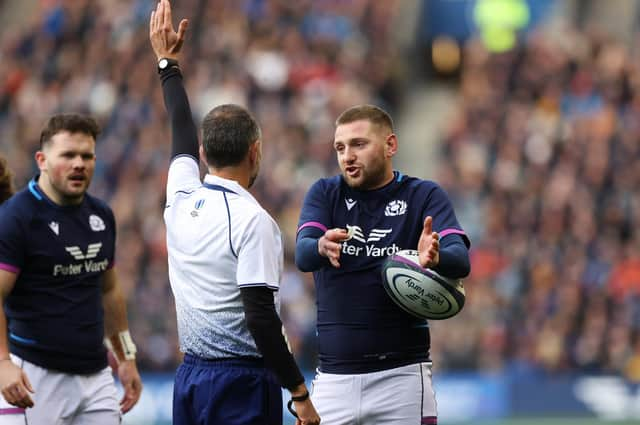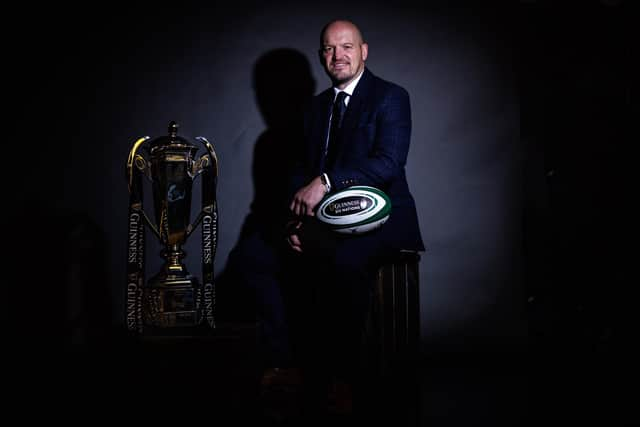Scotland captaincy examined: Russell's referee rapports, how Ritchie took decision and Darge attributes


Gregor Townsend is hoping his decision to select co-captains with contrasting strengths will help Scotland prosper in the forthcoming Guinness Six Nations as he prepares for his seventh tilt as head coach at rugby’s oldest international championship.
Finn Russell and Rory Darge are the new leaders of the squad, taking over from Jamie Ritchie, who has been told to concentrate on winning a place in the team. One area Townsend referenced a couple of times with regard to Russell was the stand-off’s easy going manner with referees. With so many Test matches now hinging on the officials’ decisions, it’s vital to build relationships with the man or woman in the middle. Townsend feels it will be easier for the Bath fly-half to do this because, unlike Ritchie, he tends not to be overly involved in the set-piece battle and he impressed the coach in this regard when he captained Scotland in the home win over France in August.
Advertisement
Hide AdAdvertisement
Hide Ad“Finn has been captain for us once and I thought he thrived that week,” said Townsend. “He was excellent with the other duties as captain including media and speaking to the referee. But the week is about him leading like he normally leads, driving the attack, bringing his experience on things he’s gone through before.


“Even when he was vice-captain, Finn was very good at interacting with the referee. Tens tend to have that connection after tries, and at the halfway line, and they are removed a little bit from the set-piece. And he’s got that level of experience. He knows where the game is going and what needs to be said to the referee.
“He’s always going to be a leader of the team, working with the captain, but I thought at the weekend there, in the Bath v Toulouse game, when they were a man down, he came in and managed the clock at times and helped the captain make decisions. So, he has always been in that role as a vice-captain and now it will be him saying to others: ‘What do you think we should do?’ But he’s the one who has got to make the decision.”
Ritchie hasn’t always had a smooth relationship with referees and Scotland have been marched back 10 yards a couple of times on his watch but it would be wrong to frame his captaincy in only those terms. He did, after all, lead Scotland to third in last year’s Six Nations, their joint highest placing since the championship expanded, and the campaign included a memorable triumph at Twickenham as well as home wins over Wales and Italy.
Townsend said the form of players like Luke Crosbie and Andy Christie means Ritchie can longer be guaranteed a starting berth and challenged him to prove he deserves one ahead of the opener against Wales a week on Saturday. “He took it very well,” said Townsend. “I’d obviously spoken to him around if he can get back playing then this is the challenge he has now with the competition we have – to get in the team – and I explained that we still hadn’t made up our mind around captaincy, but for us the captain has to be someone who is a going to be nailed-on starter, and just now that isn’t the case because of the competition, so that’s his focus. He’s been excellent through this whole process.”
The coach added: “There is time between the World Cup and the Six Nations for players to play well and to reflect on how well they led the team in the summer. Our first thought was the competition in the back row has gone up a notch. Luke Crosbie has been outstanding, Andy Christie, who missed the World Cup has been outstanding, Matt [Fagerson] and Jack [Dempsey], who are more No 8s, had been playing well and Rory, who started at openside for us during the World Cup, has been excellent.
“So that was in our minds and I also chatted to Jamie about that. The important thing for any of our leaders is to make sure they’re going to start. And that got me thinking that, if it’s going to be a real conversation around Jamie and the starting team up against those other guys, maybe we should look at someone else as captain. It was great to see Jamie play on Friday night [for Edinburgh against Scarlets] and I thought he played well. But we came to the decision over the weekend, let’s look at someone else and we then came on to the idea of co-captains. They’re both developing as leaders although they’ve not been captains for a huge amount in their careers.”
Townsend has backed Darge to “lead by example” and the Glasgow flanker’s promotion to co-captain represents another huge leap in progress for the 23-year-old. Since making his debut in Cardiff two years ago, Darge has developed into one of Scotland’s most important players and brings the physicality the back row might otherwise lack. The hope now is that he can recover from a knee injury to face Wales. If not, there is confidence he’ll be fit in time for the home match with France seven days later.
Advertisement
Hide AdAdvertisement
Hide AdTownsend has also been heartened by the form of Huw Jones who returned to the centre for Glasgow in their Champions Cup win over Toulon on Friday. Jones scored two tries and linked up superbly with Sione Tuipulotu. Also impressive were wingers Kyle Rowe, who weighed in with two tries, and Kyle Steyn, returning after a two-and-a-half month injury absence.
“Yes, I thought Huw was excellent,” said Townsend. “But also that backline, with Sione excellent too, Kyle Rowe playing his best rugby the last two weeks, and Kyle Steyn playing 80 minutes and looking really sharp. But the combination of Sione and Huw, being able to play together before the Six Nations was a bonus, and to play so well was excellent.”
Comments
Want to join the conversation? Please or to comment on this article.
